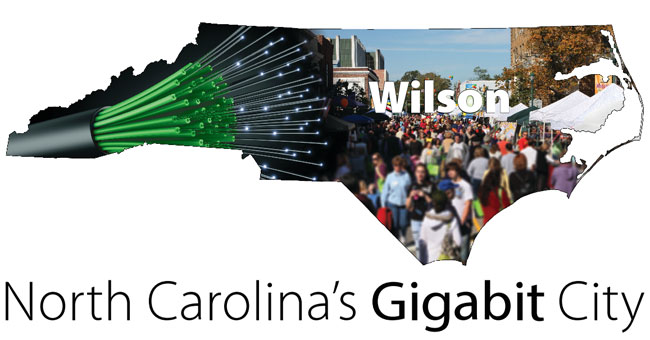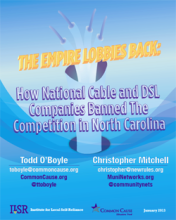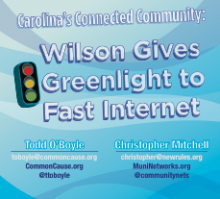
Fast, affordable Internet access for all.

The Town Council of Holly Springs, North Carolina, just voted to pursue municipal network infrastructure. The Holly Spring Sun reports that the proposed network would include Town Hall, a local business park, the wastewater treatment plant, and school facilities. Wi-fi would be available in parks and public facilities. Holly Springs is about 25,000 people in the center of the state near Research Triangle Park.
The City is pursuing a plan focused on cost-savings for community anchor institutions - North Carolina law effectively prohibits local governments from connecting businesses or residents. However, local governments can still serve schools, libraries, public safety, and the like. We have previously released a fact sheet with some of the savings other communities have seen from these investments.
Council members expressed concern over the current cost of service from private providers and expected hikes in rates:
“It’s going to continue to be more expensive for us,” said Councilman Tim Sack said, for something “that’s going to be less than what we need and more than we can afford.”
The cost for the project could range from $1.3-$1.5 million for a connection to all town facilities, [IT Director Jeff]Wilson said.
WUNC reports that CTC Technology and Energy will design the network. Joanne Hovis, CTC President, noted that the town will not offer services but building the infrastructure will hopefully encourage competition.
Holly Springs mayor Dick Sears says the council believes the town can break even by shifting funds from its current Internet service.
"I think we all felt that, yes, this would be a pay-for-itself kind of an option to take, so we're in-the-works process. But at the same time, we heard enough good news during that presentation that we want to continue the process," Sears says.
Veteran North Carolina legislator Rober Brawley resigned as Chairman of the state Finance Committee, reports local WRAL. According to WRAL's @NCCapitol blog, the Republican from Iredall read his resignation letter during a recent floor debate. He criticized Speaker of the House Thom Tillis, questioning Tillis' ethics and accusing him of special legislative favors specifically for Time Warner Cable.
One bone of contention was a bill introduced by Brawley to expand the service area for the municipal cable network MI-Connection in Mooresville. From the letter as quoted in the article:
"You slamming my office door shut, standing in front of me and stating that you have a business relationship with Time Warner," Brawley wrote. "MI Connections is being operated just as any other free enterprise system and should be allowed to do so without the restrictions placed on them by the proponents of Time Warner."
Stop the Cap covered the background of that bill in its article about this accusation:
In North Carolina, Wilson's Greenlight will begin offering gigabit residential services as early as July. Greenlight began offering FTTH service since 2008 to businesses and households and now provides affordable and reliable triple play.
Along the journey, Greenlight faced a playing field tilted in favor of incumbent providers, predatory behavior from those incumbents, and dangerous legislative barriers created by companies like Time Warner Cable and CenturyLink.
From the press release:
“In January, the Federal Communications Commission issued a challenge to communities to provide gigabit service by 2015, and we’re proud to answer that challenge now. We are excited to launch our gigabit service and allow our customers to be the first in the state to experience such high speed Internet access,” said Will Aycock, general manager of Greenlight. “Ultra-high speed Internet will help position Wilson for the future and will provide our businesses and residents with the tools they need to succeed.”

Greenlight currently serves approximately 6,000 customers in Wilson and provides service to schools throughout the larger county. The network provides free downtown Wi-Fi through the downtown area.
This March 21-22, the SouthEast Association of Telecommunications Officers and Advisors (SEATOA) will be hosting the "Networking Communities for the New South" conference. The conference will be held at the Omni Charlotte Hotel.
We are excited to see Susan Crawford as the keynote speaker. From the conference page:
She will provide a broadband policy reality check, and answer – among other questions –whether current so-called “level playing field”, “free-market” policies are leaving us with a second class network that only the rich can afford.
(For a preview, listen to Susan in a recent Broadband Bits Podcast. She talked about her recent book and discussed the need for long term U.S. telecom policy change.)
Check out the schedule and list of other speakers [PDF] and start planning your itinerary. You can also register online.
Some of the issues discussed will be:
The Tar Heel economy is continuing its transition from tobacco and textiles to high technology. Internet startups populate the Research Triangle, and Charlotte’s financial services economy depends on high-quality data connections. Truly, next-generation Internet connections are crucial to the state. It is deeply disturbing that the Federal Communications Commission ranks North Carolina at the bottom nationally – tied with Mississippi – in the percentage of households subscribing to a “basic broadband” connection. The residents and businesses of nearly every other state have superior connections.Read the whole thing here.
Fiber optic connectivity is coming soon for public facilities in Kings Mountain, North Carolina. The city has its own electric, natural gas, and water utilities and is home to a little over 10,000 people. Located along the southern edge of the state, the town is considered a suburb of Charlotte.
According to an Alicia Banks Gaston Gazette article, the City Council unanimously approved contracts to start construction and most of the city departments should be on the network before the end of the year. The city fiber optic cables amount to nine miles in length. Savings will be about $65,000 annually as the city uses its own fiber to supply phone and Internet connections rather than lease services. From the article:
“We should start seeing the savings within seven years,” Kings Mountain Mayor Rick Murphrey said. “It’s cheaper to use your own fiber optics."
Though seven years may seem like a long time to wait for savings, recall that these connections will be needed indefinitely. Further, these networks often lead to unanticipated benefits that can make the savings occur faster than forecast.
The entire project will cost $495,722 under a five-year payment plan. Also from the article:
“Taxpayers' dollars are helping to pay for this, but no increase,” Murphrey said about rates. “(Funds will also) come out of the electric, gas and water fund.”
Kings Mountain is another community choosing to use their current fiber resources to provide broadband to city facilities and save taxpayer dollars. Our recent Public Savings Fact Sheet, highlight a few of many other communities that choose this route.

In late 2006, Wilson, North Carolina, voted to build a Fiber-‐to-‐the-‐Home network. Wilson’s decision came after attempts to work with Time Warner Cable and EMBARQ (now CenturyLink) to improve local connectivity failed.
Wilson’s decision and resulting network was recently examined in a case study by Todd O’Boyle of Common Cause and ILSR's Christopher Mitchell titled Carolina’s Connected Community: Wilson Gives Greenlight to Fast Internet. This new report picks up with Wilson’s legacy: an intense multiyear lobbying campaign by Time Warner Cable, AT&T, CenturyLink, and others to bar communities from building their own networks. The report examines how millions of political dollars bought restrictions in the state that will propagate private monopolies rather than serve North Carolinians.
Download the new report here: The Empire Lobbies Back: How National Cable and DSL Companies Banned The Competition in North Carolina
These companies can and do try year after year to create barriers to community-‐owned networks. They only have to succeed once; because of their lobbying power, they have near limitless power to stop future bills that would restore local authority. Unfortunately, success means more obstacles and less economic development for residents and businesses in North Carolina and other places where broadband accessibility is tragically low.
It certainly makes sense for these big companies to want to limit local authority to build next-‐generation networks. What remains puzzling is why any state legislature would want to limit the ability of a community to build a network to improve educational outcomes, create new jobs, and give both residents and businesses more choices for an essential service. This decision should be made by those that have to feel the consequences—for better and for worse.
This story was originally posted on the ILSR website.

As we emphasize time and time again, communities build their own networks because they have to, not because they want to. North Carolina's Fibrant network in Salisbury is no exception and a recent technical headache is a reminder that no network is built without problems developing.
Fortunately, Salisbury's strong reputation for providing great, local customer service is helping as it deals with service interruptions that are the fault of the gear that runs the network.
According to an Emily Ford article in the Salisbury Post, there have been several outages this month. While some outages are attributed to unreliable access gear, the city is still investigating to determine what other factors continue to cause problems. The network currently serves 2,160 subscribers, with 220 of them being commercial customers.
A November 9th Post article on an earlier outage, noted the problem with faulty equipment. A statement from Fibrant General Manager Mike Jury also attributed the outage to a lack of redundancy, which has since been repaired.
While Zhone has been the access gear supplier, Fibrant is now testing Calix equipment. Calix has long been a favored choice among community networks and has a very solid reputation. This is a reminder to communities of the importance of due diligence in choosing vendors -- make sure to talk to other community networks about their experiences with vendors. All equipment is subject to failure, so a key question should be how quickly different vendors respond with solutions to problems.
This technical problem comes on the heels of political problems as Salisbury has been targeted by Time Warner Cable for attacks. Readers will recall how Time Warner Cable successfully pushed the Legislature to pass H129 in 2011, a bill to neutralize publicly owned networks.
Even though there have been recent outages, more people continue to take the service than to drop it. From the Ford article:
The week before the outage, 23 new subscribers signed up.